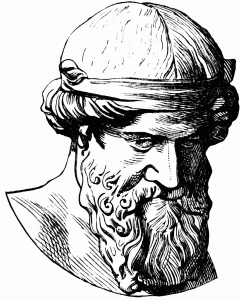Chapter 3: Polytheism: Greek Gods, Goddesses and Minor Deities

East pediment of the Parthenon (reconstruction), Athens, mid 5th c. BCE
Chapter Introduction
Unlike most major religions practiced today, ancient Greek religion was polytheistic (the worship of multiple gods) and inherently hospitable to new gods, ideas, and interpretations. While specific gods were sometimes invoked, in daily life divinity was often conceived of as a “nameless collective”, if only because people could never be sure which god was responsible for a particular divine intervention. While Greek city-states worshipped the same pantheon of major gods, Greek polytheism was multifaceted and different city-states tended to favor different gods (or more usually goddesses) as their prominent deities. For instance, while the Athenians worshipped all of the Olympian gods, they favored Athena, the namesake of their city. The Parthenon, the greatest temple on the Athenian akropolis, was dedicated to Athena Parthenos, as were several other temples and structures on the akropolis (e.g. Erechtheion and the temple of Athena Nike).
The sourcebook readings (Chs. 9-10) focus upon the ways in which Greek literary sources represented the gods and justice, with a particular emphasis upon Zeus. Reading 1, below, provides a detailed analysis of Greek polytheism, which included not only the major gods of the pantheon, but also lesser gods and even nameless divinities. These were often associated with nature or natural forces. Parker also stresses the different modes of action that deities were associated with, typically expressed by means of epithets (honorary titles), such as Zeus Basileus (Zeus “the King”) or Athena Hippia (Athena “of the horses”). Reading 2 provides more information about epithets, including the types of epithets and their usages. Reading 3 provides a general discussion of the lesser deities, including nymphs, satyrs, the Muses, and the Seasons.

Tasks: Complete the readings, below, then go to the Blackboard course page. Don’t forget that you’ve also been assigned primary source reading: Greek Religion, V. Warrior, Chapters 9-10. Take the Module Test and contribute to Discussion Topic 2. You have TWO WEEKS to complete this Module.
NB: You will be tested on Readings 1-3. Discussion Topic 2 refers to the assigned reading from the sourcebook.
This chapter includes the links to the readings (see below). When you click the links, you may have to log in with your CSU library ID and password. PDF copies of all of the readings are available in the One Drive folder (see the left-hand menu of the course Blackboard page for the link to One Drive).
Weblink: Polytheism (Britannica)
Documentary: Zeus, King of the Gods
Reading 1: “Analyzing Greek Gods”, in On Greek Religion, R. Parker (2011)
Reading 2: “Names and Epithets”, in Greek Gods Abroad, R. Parker (2017)
Reading 3: “Lesser Deities and Nature-Spirits” (Chapter 6), in The Routledge Handbook of Greek Mythology (2004)

